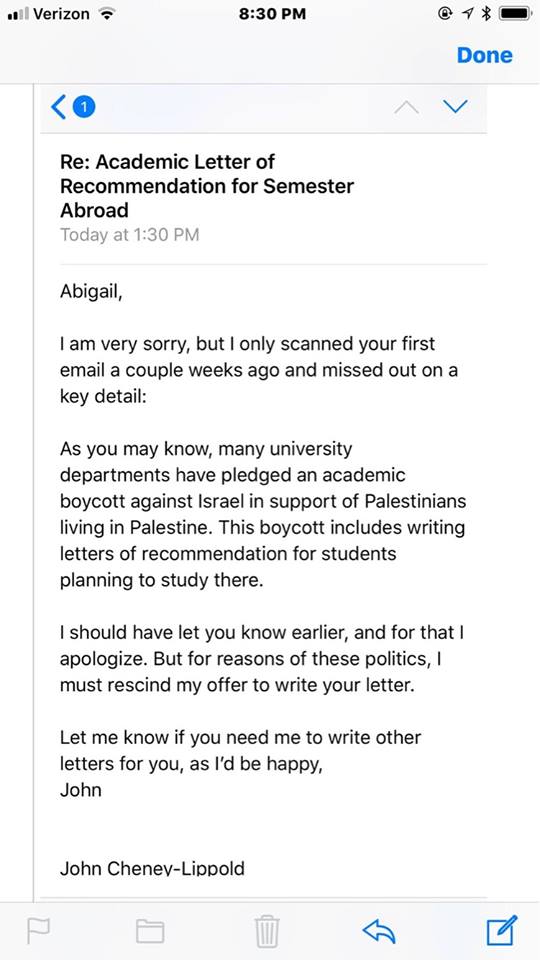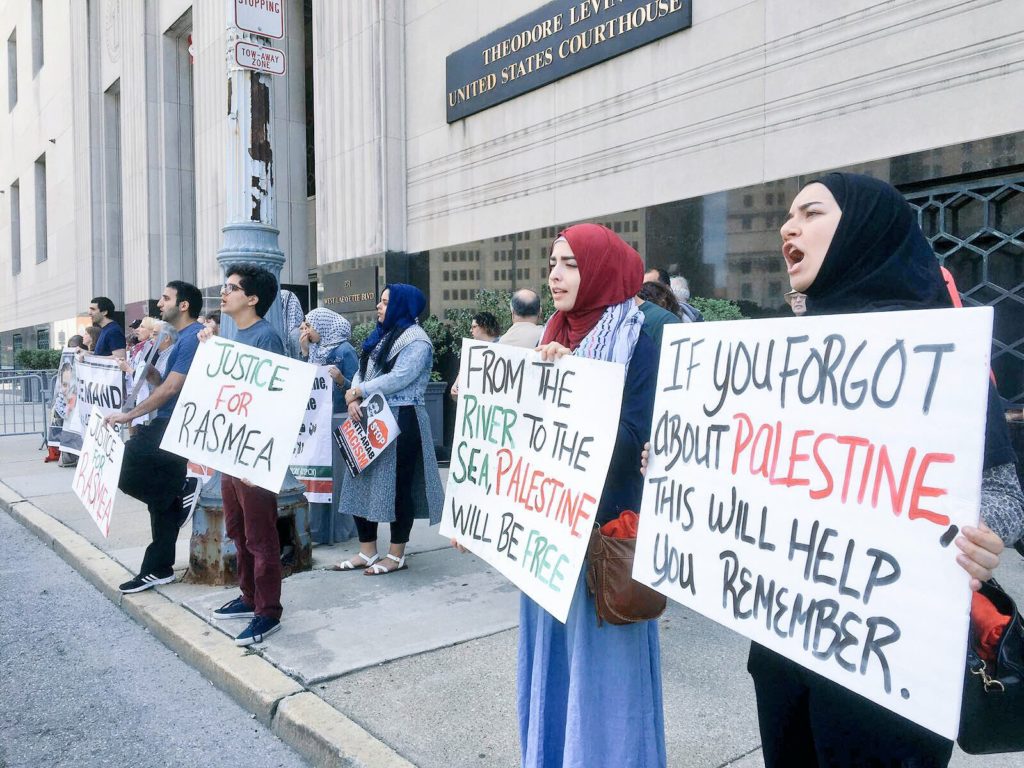University of Michigan professor encourages bigotry
Recently, John Cheney-Lippold, an associate professor in the American Culture Department at the University of Michigan, declined a student’s request for a recommendation letter for a study abroad program, with vocal support from multiple activists on campus. The reason? The student’s intention to study in Israel. Claiming that some departments (not necessarily at the University) support an academic boycott against the Jewish state, Cheney-Lippold insisted his actions are “in support of Palestinians living in Palestine,” and driven by “solidarity.”
He also mentioned his desire to “focus on the importance of dialogue.” But what could be more stifling of dialogue and academic discovery than an attempt to destroy a student’s ability to see the situation directly? The anti-Israel Boycott, Divestment and Sanctions movement (which Cheney-Lippold’s actions are undoubtedly inspired by) does not foster dialogue. It distorts reality in order to paint an incredibly complicated geopolitical conflict as black and white and does nothing to advance peace in the Middle East.

Cheney-Lippold’s stance that only Israel deserves to be punished for the Palestinians’ current hardships ignores crucial details of the history of the Arab-Israeli conflict and erases any Palestinian governmental responsibility for the present state of affairs. Opportunities for the creation of a Palestinian state (some even offered by Israel) have presented themselves on at least four occasions: 1937, 1947, 2000 and 2008. Every offer was rejected and accompanied by violence. In 2000, shortly after Israeli Prime Minister Ehud Barak agreed to Palestinian statehood, the Palestinian leadership launched a violent uprising, or intifada, against Israel that lasted until 2005. During this period, Palestinian terrorists carried out hundreds of suicide bombings that targeted Israeli civilians, killing over 1,000 Israelis.
It was only in response to this onslaught that especially stringent security measures were implemented in the West Bank, including the construction of the barrier that separates the territory from Israel proper (which, notably, nearly eliminated suicide bombings against Israelis, while also saving many Palestinian lives). Despite the horrific violence organized by the highest levels of the Palestinian government, we hear no calls from Cheney-Lippold or BDS-supporting students to boycott the Palestinian territories, even though the University runs a study abroad program in Ramallah.
While defending Cheney-Lippold’s and other similar anti-Semitic actions, students that support BDS frequently utter patently absurd remarks. As reported by The Michigan Daily, some insist that a trip to “Israeli-occupied Palestine,” implying that Israel’s mere existence is illegitimate, necessarily entails “support of the mass murder and oppression of not only Palestinians, but Ethiopian Jews, Mizrahi Jews, East-Asian immigrants, and other non-white minority communities.” This claim is laughable and highlights the profound ignorance of Middle Eastern demographics and politics. The implication that “whites” are the clear majority in Israel is false. Almost half of the Jews in Israel are from the Middle East and North Africa (Mizrahi). Israeli officials are most certainly not engaging in the “mass murder” of this community and the Palestinians — the Israeli government has actually dedicated billions of dollars to improve its Arab citizens’ livelihoods.
As Victor Lieberman, a professor in the History Department, has noted, “the thrust of (Israeli) government policy is not exclusion, but integration.” Bizarre claims that the Israeli government is “mass murdering” both Palestinians and its own citizens is simply wrong, and contemptibly libelous. It resembles the most egregiously anti-Semitic bigotry.

It is wrong to only blame, and subsequently punish, the Israeli side for its attempts to protect its citizens in this unimaginably complicated conflict, and Cheney-Lippold is enabling this injustice. Furthermore, it is remarkably inappropriate (and borderline malicious) for a professor to attempt to derail a student’s academic plans because of political differences. Would it be justified, for example, for right-leaning faculty of an entire academic department to systematically decline recommendation letters for liberal students? Of course not. That would constitute obvious discrimination, and Jewish students who want to study in Israel should enjoy the same standards of respect. The student whose letter was declined deserves the right to arrive at her own conclusions and to travel the academic path that she feels is best.
The student whose letter was declined deserves the right to arrive at her own conclusions and to travel the academic path that she feels is best.
She does not deserve punishment for Israeli government actions, as she has nothing to do with them (a tenet of the U.S. Department of State’s definition of anti-Semitism involves “holding Jews collectively responsible for actions of the state of Israel”). For all we know, this student may vigorously oppose Israeli government policy in the West Bank and Gaza and could be traveling there to study the conflict and work to find solutions for it. We have no idea. But none of this seems to matter for Cheney-Lippold and like-minded crusaders.
The University community should unequivocally condemn the BDS movement and the bigotry that it encourages. Students should be able to participate in any study abroad program available to them, and no amount of self-righteous, woefully uninformed indignation should stand in the way of our future leaders’ academic goals.
Contributed by Campus Cooridantor Zac Schildcrout. Originally published at Michigan Daily.

